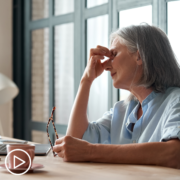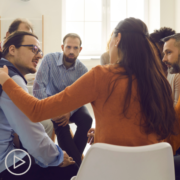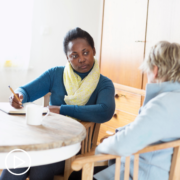Tag Archive for: peer support
Expert Advice for Patients With Small Cell Lung Cancer
Expert Advice for Patients With Small Cell Lung Cancer from Patient Empowerment Network on Vimeo.
Dr. Triparna Sen, a leading small cell lung cancer (SCLC) researcher and expert, shares key advice for patients. Dr. Sen stresses the importance of working closely with your doctor, asking about clinical trials options, and the benefits of support groups.
Dr. Triparna Sen is an associate professor in the department of oncological sciences and co-director of the Lung Cancer PDX Platform at the Icahn School of Medicine at Mount Sinai in New York. Learn more about Dr. Sen.
See More from Thrive Small Cell Lung Cancer
Related Resources:

|

Advances in Small Cell Lung Cancer Research | Hope for the Future |

|
Transcript:
Katherine:
What three key pieces of advice would you have for a patient who has just been diagnosed with small cell lung cancer?
Dr. Sen:
First of all, I would like to say definitely, definitely work with your physician. They are trying to do their best for you. Work with your physician. Follow the treatment regimen that they give. Ask about clinical trials that you are eligible for and that you can enroll into. Then, of course, having a support group. So, there are many patient advocacy groups right now for non-small cell and small cell lung cancer.
I think being a part of such a patient advocacy group where you have people going through the same journey, I think, it really helps. It helps you sort of manage your disease better. It helps you stay hopeful when you hear about other people’s sort of prognosis and if they have durable benefits from drugs. So, I think having a support group is very important. If there is an ability for you to contribute to research in terms of giving blood or tissues, if your physician is saying that you could be eligible for that, I think a contribution to research is really key.
Because looking at the disease mechanisms in the clinical tissue is sort of where for us it is absolutely golden. We go there. We look at the disease mechanisms and tissues. If there is an opportunity for you, then I think it should definitely be explored.
Finally, I would like to say we are really trying as researchers to really understand the disease better. We’re trying to do that better. I hope and I pray that we go faster with it. But I think there is hope right now for patients with small cell lung cancer. The research is really progressing better. There are many clinical trials.
So, I think stay hopeful and have a peer support group who can take you through this quite difficult journey.
Katherine:
Why should patients consider consulting with a lung cancer specialist?
Dr. Sen:
I think it’s crucial because these lung cancer specialists really know the current state of the art treatments. They are thought leaders. They participate in trials. They actually sit on advisory boards with companies.
They are strategizing the entire treatment landscape for this disease. So, if you go to a lung cancer specialist, you’re more likely to get the most updated knowledge about what treatments are out there, what you qualify for, what are the clinical trials out there, and what are working in patients. This is not just for small cell. There are many, many trials that are happening in non-small cell also. So, whatever your diagnosis is, a specialist should be able to tell you what your options are. You really want to know about your options. Your options about biomarker testing.
Your options about screening. Your options about trials. I think a lung cancer specialist can really guide you towards that.
Katherine:
Dr. Sen, thank you so much for joining us today. It’s been a pleasure speaking with you.
Dr. Sen:
Thank you.
The Value of Myeloma Support Groups and How to Join
The Value of Myeloma Support Groups and How to Join from Patient Empowerment Network on Vimeo.
How might joining a support group benefit you when coping with a myeloma diagnosis? Yu Mee Song, an oncology social worker, discusses the value in peer-to-peer connection and shares tips and resources for finding a support group.
Yu Mee Song, LCSW, OSW-C is a Social Work Program Coordinator at the Center of Excellence for Multiple Myeloma Program at Mount Sinai Hospital. Learn more about Yu Mee Song.
See More From Thrive CAR T-Cell Therapy
Related Resources:

|

|

|
Transcript:
Katherine Banwell:
Yu Mee, what is the value of myeloma support groups? And how would you encourage someone to join if they’re hesitant?
Yu Mee Song:
So, it’s – it’s – it’s not for everyone. And you may need to try more than one support group to find the one that’s a good fit for you. But it does provide a sense of belonging and the decreased feeling of isolation, like you’re going through this alone, to be in a group with others who – who kind of – who get you. And I’ve had a lot of people say, you know, it’s really , really hard to talk about this – what I’m going through – with my friends or family they just don’t get it. And it’s so good to see – and we facilitate some groups here for newcomers to join. And as soon as they, you know, speak about something and the whole group chimes in and, yes, we know what you’re going through and give their – share their story and their experience. And it’s so inspiring and encouraging for them.
Katherine Banwell:
Yeah. It’s incredibly valuable.
Yu Mee Song:
They share all sorts of tips on things like side effects and – or how to – how to talk to your doctor about something if you’re uncomfortable bringing it up or, um, even asking for help about, um, you know, for counseling or more emotional support that you may be embarrassed to ask about.
Katherine Banwell:
How would a newly diagnosed myeloma patient find out about something like a peer-group session or peer support?
Yu Mee Song:
There may be some local. But now there are many national organizations that you can tap into. I would start, again, like, ask – speaking with your oncology social worker. But I would start with some of the national organizations like Multiple Myeloma Research Foundation, International Myeloma Foundation, The Leukemia & Lymphoma Society, platforms like this the Patient Empowerment Network, or HealthTree.
So, if you start with any of the big myeloma organizations, they can help guide you. There are patient navigators that can kind of guide to your – provide guidance to what you’re looking for, whether it’s peer-to-peer support, support group, or other resources.
Advice for Myeloma Patients Undergoing CAR T-Cell Therapy
Advice for Myeloma Patients Undergoing CAR T-Cell Therapy from Patient Empowerment Network on Vimeo.
How can patients undergoing CAR T-cell therapy be prepared? Yu Mee Song, an oncology social worker, shares three key pieces of advice for patients and care partners getting ready for CAR T-cell therapy.
Yu Mee Song, LCSW, OSW-C is a Social Work Program Coordinator at the Center of Excellence for Multiple Myeloma Program at Mount Sinai Hospital. Learn more about Yu Mee Song.
See More From Thrive CAR T-Cell Therapy
Related Resources:

Considering CAR T-Cell Therapy For Myeloma? Key Questions to Ask Your Doctor. |

|

|
Transcript:
Katherine Banwell:
For patients who are considering CAR T-cell therapy, what three key pieces of advice would you have for them?
Yu Mee Song:
I think it’s really important to have someone accompany you to maybe the initial consultation.
Or if they can’t physically be with you to have them available by phone or to listen in on a conference call because there’s so much information that’s provided. It’s – it’s a multi-step, complicated process, so it’s good to have a – another set of ears helping you to stay organized, take notes maybe, keep a calendar.
Another thing is to plan ahead. Plan for time away from work. You may need to apply for FMLA. If you are a caregiver of young children or older parents, make arrangements for that. Especially if you live a distance from the treatment center, you may need to stay close to the hospital for a couple of weeks after your discharge for your CAR T-cell infusion.
Katherine Banwell:
Yeah.
Yu Mee Song:
And then I would say another tip is to stay connected to home, so there are many online forums that you can use to – for – for your friends and family to provide support in that way and for you to share information. And maybe bring pictures or something cozy from home to remind you of home because you will be – be away for some time.
360 Myeloma Care | How Can a Social Worker Help?
360 Myeloma Care | How Can a Social Worker Help? from Patient Empowerment Network on Vimeo.
When coping with a myeloma diagnosis, how can a social worker support you in your care? Yu Mee Song provides an overview of the role of a social worker in myeloma care and discusses the importance of speaking up about emotional issues and beyond.
Yu Mee Song, LCSW, OSW-C is a Social Work Program Coordinator at the Center of Excellence for Multiple Myeloma Program at Mount Sinai Hospital. Learn more about Yu Mee Song.
See More From Thrive CAR T-Cell Therapy
Related Resources:

How Can A Social Worker Help CAR T-Cell Therapy Care Partners? |

|

|
Transcript:
Yu Mee Song:
My name is Yu Mee Song. I am, a social work program coordinator in the Multiple Myeloma Program at Mount Sinai Hospital.
Katherine Banwell:
Excellent.
Yu Mee Song:
Thank you for having me.
Katherine Banwell:
Thank you for joining us. Can you tell us more about the role of a social worker as it relates to myeloma care?
Yu Mee Song:
First of all, I feel very, very fortunate to be working in the myeloma program amongst world-renowned myeloma specialists with a team of nurse practitioners, nurses, transplant and CAR T coordinators, patient navigators.
And our social work team is a team of five. And we can receive referrals from any of these team members at any point in a patient’s journey, from the moment of diagnosis throughout their treatment trajectory in both the inpatient and the outpatient settings for emotional needs and support to practical needs.
Katherine Banwell:
Yu Mee, when a myeloma patient comes to see you for the first time, what are some common concerns they might be having?
Yu Mee Song:
That really depends on the – on the patient and – and where they are in their life situation when they’re diagnosed. You know, if they’re working, they may have considerations about reducing work or not working or not being able to. A lot of practical concerns, maybe the first issue that they have to deal with such as transportation and getting to and from the cancer center now three times a week, or navigating the healthcare system for the first time in their life, and insurance or just coping with the fact that you’re now dealing with the diagnosis of myeloma and what does that mean and how are you adjusting to this? So, it really varies.
Katherine Banwell:
If patients are facing emotional issues, why is important for them to speak about it? And – and what support is available for them?
Yu Mee Song:
That’s – that’s a great question that I always like to stress the importance of to the patients and also the caregivers because they’re usually the ones that first notice any changes, maybe in their mood or the emotional state.
If you’re holding things in, you’re, you know, feeling like you’re alone in this fight or your fears of what might happen, that can increase your anxiety, it might lead to depression.
So, it’s really important to speak about it, ask your care team about it. It may be as simple as, you know, that’s a side effect of a medication that you’re on, and maybe we can reduce the dose or maybe we can tell you to take it at a different time of day.
And that’s so helpful to know that.
There may be help for you. You may be referred to a mental health professional, support groups, and would also improve your – your relationships within your family because obviously your emotional state it’s – it, you know, myeloma is just not impacting you but all of the loved – people around you.
Katherine Banwell:
That leads us into the next question. Some patients don’t have a partner to help them go through this – this journey with their myeloma. So, do you have any suggestions for how myeloma patients can find support and where?
Yu Mee Song:
I would say, first start with asking your care team or ask – speaking with an oncology social worker. Support doesn’t necessarily mean your – your partner. It can be in the form of support groups that are either in-person, there are many groups online.
It could be a peer – one-on-one peer support. Someone who’s gone through what you’ve gone through.



